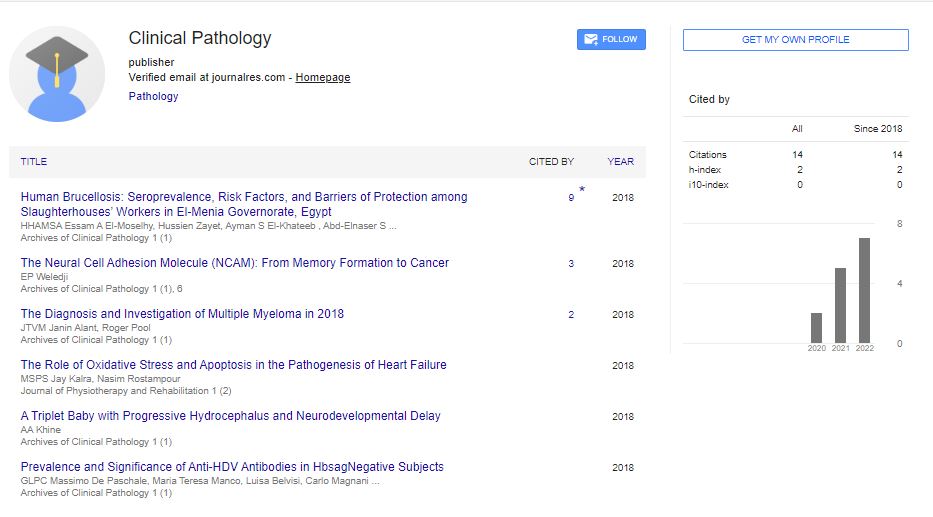Perspective, Arch Clin Pathol Vol: 6 Issue: 2
Advancing Dermatopathology in the Era of Precision Medicine
George Marina*
Department of Dermatology, Loma Linda University, Loma Linda, USA
*Corresponding Author: George Marina
Department of Dermatology,
Loma Linda University, Loma Linda, USA
E-mail: mari@george.llu.edu
Received date: 28 May, 2023, Manuscript No. ACPY-23-107071
Editor assigned date: 31 May, 2023, Pre QC No. ACPY-23-107071 (PQ);
Reviewed date: 14 June, 2023, QC No. ACPY-23-107071;
Revised date: 22 June, 2023, Manuscript No. ACPY-23-107071 (R);
Published date: 28 June, 2023, DOI: 2324-8955/acpy.05.03.100088
Citation: Marina G (2023) Advancing Dermatopathology in the Era of Precision Medicine. Arch Clin Pathol 6:2.
Description
Dermatopathology is a specialized field of pathology that focuses on the diagnosis and study of skin diseases. It involves the examination of skin tissue samples under a microscope to identify and characterize various skin conditions, including inflammatory disorders, infections, autoimmune diseases, and skin cancers. Over the years, dermatopathology has played an essential role in guiding clinical decision-making and treatment planning for patients with skin diseases. However, with the advent of precision medicine, there is an opportunity to further advance dermatopathology by integrating molecular and genomic techniques into the diagnostic process. This study discuss the concept of advancing dermatopathology in the era of precision medicine, highlighting the potential benefits and challenges associated with this approach.
Precision medicine is a paradigm shift in healthcare that emphasizes the customization of medical treatments based on an individual's unique genetic makeup, environmental factors, and lifestyle. It aims to deliver the right treatment to the right patient at the right time, resulting in improved patient outcomes and reduced healthcare costs. In dermatology, precision medicine has gained momentum due to significant advancements in molecular biology and genomic sequencing technologies. These advancements have provided insights into the underlying molecular mechanisms of various skin diseases and have identified potential therapeutic targets.
Incorporating molecular and genomic techniques into dermatopathology practice has the potential to enhance diagnostic accuracy, refine disease classification, predict treatment response, and identify new therapeutic targets. Some of the key advancements in dermatopathology include:
Molecular profiling involves analyzing the genetic and molecular alterations in skin tissue samples. Techniques such as DNA sequencing, gene expression profiling, and mutation analysis can provide valuable information about the genetic mutations, chromosomal rearrangements, and gene expression patterns associated with specific skin diseases. This information can help in disease classification, prognosis determination, and treatment selection.
Immunohistochemistry (IHC) is a technique used to detect specific proteins in tissue samples. In dermatopathology, IHC can be used to identify specific markers associated with certain skin diseases, such as melanoma or lymphoma. It can also help differentiate between different subtypes of skin cancers and guide treatment decisions.
Next-Generation Sequencing (NGS) technologies have revolutionized the field of genomics by enabling the rapid and cost-effective sequencing of large amounts of DNA or RNA. In dermatopathology, NGS can be used to identify specific genetic mutations or fusion genes that drive the development and progression of skin diseases. This information can be used to guide targeted therapies and monitor treatment response.
Digital pathology involves the digitization of microscopic images and the use of computer-based image analysis techniques. It allows for the storage, retrieval, and analysis of digital pathology slides, enabling remote consultations, collaborative discussions, and automated image analysis algorithms. Digital pathology can enhance workflow efficiency, facilitate second opinions, and support data-driven decision-making in dermatopathology.
Advancing dermatopathology in the era of precision medicine offers several potential benefits. It can lead to improved diagnostic accuracy, allowing for more precise disease classification and personalized treatment selection. It can also provide insights into the molecular mechanisms underlying skin diseases, leading to the discovery of new therapeutic targets and the development of targeted therapies. Furthermore, precision medicine approaches in dermatopathology can help identify patients who are more likely to respond to specific treatments, minimizing unnecessary treatment and potential side effects.
However, there are challenges that need to be addressed. Integration of molecular and genomic techniques into routine dermatopathology practice requires expertise, infrastructure, and standardized protocols. There is also a need for large-scale collaborative studies and comprehensive databases to validate the clinical utility of molecular markers and genetic alterations in dermatopathology. Additionally, ethical considerations, data privacy, and cost-effectiveness should be carefully evaluated when implementing precision medicine approaches in dermatopathology.
Advancing dermatopathology in the era of precision medicine holds great promise for improving patient care and outcomes in the field of dermatology. By integrating molecular and genomic techniques into routine practice, dermatopathologists can enhance diagnostic accuracy, refine disease classification, and identify personalized treatment strategies. However, further research, collaboration, and standardization efforts are needed to fully realize the potential of precision dermatopathology. With continued advancements in technology and increasing understanding of the molecular basis of skin diseases, precision medicine approaches will undoubtedly transform the field of dermatopathology and contribute to personalized patient care.
